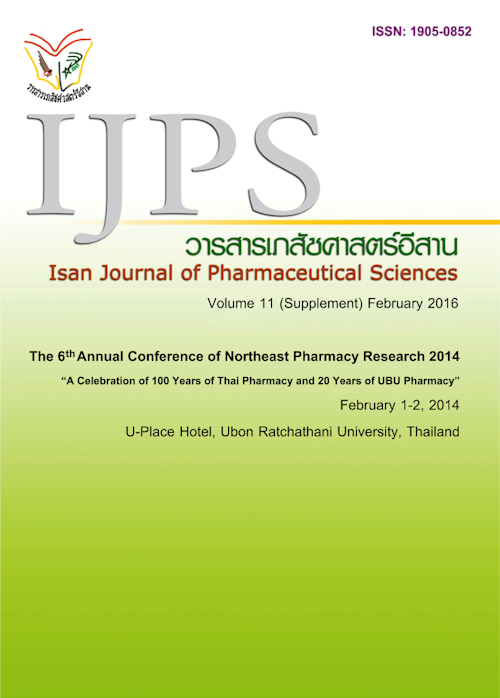Perceptions and Understandings of Drug use in Schizophrenia Patients at Prasrimahabhodi Psychiatric Hospital
Main Article Content
Abstract
Introduction: Schizophrenia is one of important health problems in Thailand. Medication treatment and compliance lead to effective outcomes. Materials and Method: This study was a cross-sectional descriptive research. Subjects were schizophrenic patients from outpatient department of Prasrimahabhodi Psychiatric Hospital, Ubon Ratchathani. Data were collected during April to August 2012 computer-based patient profile, medical record, and structured-patient interview. Descriptive statistics and Chi-square test were used to analyze the data. Results: There were 127 schizophrenic patients voluntarily participating in this study. About one half was male (52.00%). The average age was 39 years old. Regarding perception about disease and medication, most patients lack awareness of their illness and antipsychotics used (85.04% and 96.06%, respectively). Most subjects (96.85%) reported that they received medication advises from health care providers especially pharmacists during medication dispensing process (71.65%). Only 20% received formal individual counseling. With regard to perceptual problems of antipsychotics use, most subjects had poor knowledge related to their medications. Most did not know medication’s name, indications, dose, and common adverse drug reactions (75.59%, 96.06%, 70.87%, and 96.85%, respectively). The only one issue that most samples know about their medication was dosage administration (96.06%). Some patients lacked of knowledge about duration of treatment (21.26%) and they misunderstood that they could stop medication when the symptoms improved (12.59%). One major finding is that ability to read medication label was a statistically significant factor associated with the right dosage administration (p <0.01). Conclusion: Most patients with schizophrenia had poor perception of disease and medication. Ability to read medication label may help patients taking medication correctly. In conclusion, healthcare provider should play an important role in providing information of disease and medication in order to improve health outcomes and quality of life.
Article Details
In the case that some parts are used by others The author must Confirm that obtaining permission to use some of the original authors. And must attach evidence That the permission has been included
References
Brown MT and Bussell JK. Medication adherence: who cares? Mayo Clin Proc 2011; 86(4): 304-14.
Department of Mental Health, Ministry of Public Health. Annual report 2011. Bangkok: Bangkok Block. 2011, 108-18.
Fenton WS, Blyler CR, Heinssen RK. Determinants of medication compliance in schizophrenia: empirical and clinical findings. Schizophr Bull1997; 23: 637–51.
Gilmer TP, Dolder CR, Lacro JP, Folsom DP, Lindamer L, Garcia P, Jeste DV. Adherence to treatment with antipsychotic medication and healthcare costs among medicaid beneficiaries with schizophrenia. Am J Psychiatry 2004; 161: 692–9.
Kripalani S, Schnotzer B, Jacobson TA. Improving medication adherence through graphically enhanced interventions in coronary heart disease (IMAGE-CHD): a randomized controlled trial. J Gen Intern Med 2012; 27(12): 1609-17.
Valenstein M, Ganoczy D, Mc Carthy JF, Kim HM, Lee TA, Blow FC. Antipsychotic adherence overtime among patients receiving treatment for schizophrenia: a retrospective review. Clin Psychiatry 2006; 67: 1542–50.
Velligan DI, Diamond PM, Mintz J, Maples N, Li X, Zeber J. The use of individually tailored environmental supports to improve medication adherence and outcomes in schizophrenia. Schizophr Bull 2008; 34: 483–93.
Weiden PJ, Kozma C, Grogg A, Locklear J. Partial compliance and risk of hospitalization among California Medicaid patients with schizophrenia. Psychiatr Serv 2004; 55: 886–91.
Zygmunt A, Olfson M, Boyer CA, Mechanic D. Interventions to improve medication adherence in schizophrenia. Am J Psychiatry 2002; 159: 1653-64.


